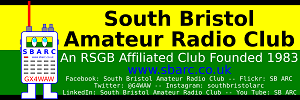Introduction
It may surprise you to know that there are over 70,000 licensed radio amateurs (hams) in the UK. Even more surprising is that there are around 2.6 million licensed radio amateurs in the world.
Amateur radio is a hobby for all ages and abilities; it transcends: age, culture, sex, religious beliefs, national boundaries and even language.
Most of us have idly turned the dial on a radio looking for interesting radio stations or searching for the World Service whilst holidaying in foreign parts; maybe, even, eavesdropped on aircraft at the local airport, shipping in coastal regions or Citizens Band (CB) Radio. To be a listener requires no licence and if the listening extends to the short wave bands, you become known as a S.W.L (short wave listener).
However, short wave listening can have a much wider scope, such as monitoring all of the amateur bands and amateur modes.
It may come as a surprise to discover how many different frequency bands are allocated to the world’s radio amateurs. Equally, the range of operating modes permitted under an amateur licence is quite remarkable. These range from: simple Morse Code, speech using AM, FM or SSB, computer data, teletype, video, microwave, and amateur satellites. It is this range and opportunity that makes amateur radio such an absorbing hobby. If you took a dozen or more of the 70,000+ licensed amateurs and asked them what it was that they enjoyed about amateur radio you’d get at least half a dozen different answers.
Amateur radio is an ideal hobby for the newly retired, providing a perfect way of keeping “the little grey cells” active. For the young, a pass in the Amateur Radio Examination on your C.V. can enhance your chances of getting a job ahead of other applicants.
Getting Licensed
To transmit on the amateur bands you must prove your technical competence by passing an amateur radio exam. There are currently 3 levels of licence: Foundation, Intermediate and Advanced. Each confers increasing privileges and is progressively more testing in the depth of knowledge required to demonstrate technical and operational competency.
We run courses designed to teach you the knowledge required to pass these exams and can tailor the courses to suit the capability and background of the students. The entry level Foundation Exam, is designed so that people with no radio background are able to reach a level of knowledge allowing them to get on air and experiment. Once their experience increases they can move to the higher qualifications gaining access to other bands, greater power and other privileges.
Foundation, Intermediate and Full Licence Exams can be held remotely or at an exam venue usually maintained by a local club. In both cases the exam will be taken using a computer, the difference is that if it is taken at a club the invigilation is on-site whereas with the Remote Invigilation the invigilator is at a remote location and uses webcams to monitor the student taking the exam.
Exams taken on a computer, either at a club or via the remote invigilation system, are marked on completion of the exam so you will know your result as soon as you complete the exam.
